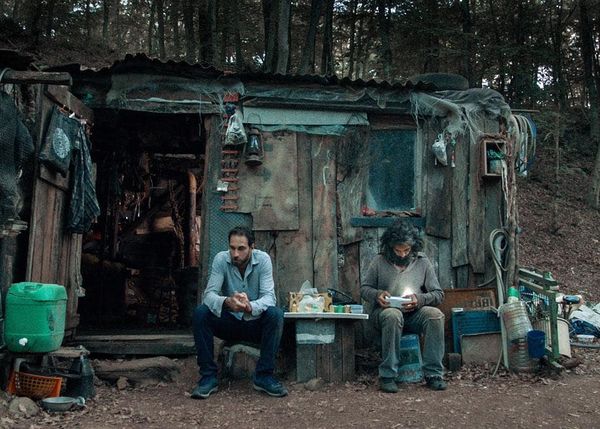Eye For Film >> Movies >> Yuva (2018) Film Review
Yuva
Reviewed by: Amber Wilkinson

The idea as the forest as a place of transformation is firmly embedded in cultures across the globe stretching back into myth - a fine background, then, for Turkish writer/director Emre Yeksan to draw on for his latest film, Yuva.
One of three Biennale College films at this year's Venice Film Festival - which sees selected projects mentored through production in the space of less than a year - even the name is ripe with different possibilities, translated as 'Home' on the college website, the word can also be used to refer to more animalistic dwellings, such as dens or nests.
We hear the forest before we see it, birds chattering away to one other in a chorus, suddenly shattered by the sound of a gunshot - a type of violent punctuation that Yeksan will use repeatedly. When visuals come, it's hard to make out the fortysomething Veysel (Kutay Sandikçi), who is redolent of a 'green man', seeming to almost grow out of the undergrowth as he tends to what we come to realise is an injured animal on the ground, carting it off to the base of a tree that will be a source of increasing mystery as the story progresses.
The film has a clearly defined three-act structure and is at its best in the first, where Yeksan shows excellent command of visual storytelling, immersing us in Veysel's world, mostly silent except for birdsong and dog barks, building tension through his micro-changes in body language and allowing the simple act of a blood-red cross being painted on a tree to feel weighted with portent. The film's general quietness encourages us to concentrate more fully on the environment and Veysel's place within it, so that we feel the intrusion as much as he does when his brother Hasan (Eray Cezayirlioglu) arrives in the film's middle section in a bid to make him leave before others take matters into their own hands.
The second act, while a departure from the quiet and mysterious character study of the first, also holds pleasures, particularly in the way that Yeksan shows the brothers' relationship through gesture and small acts of tenderness or shared jokes that stem from a lifetime of knowing another person. The filmmaker's problems gather like clouds, however, as he tries to marry larger themes to his smaller scale drama. Hints of a backstory for the two men never amount to more than that, while the political allegory of a potentially deadly force's incursion into the forest fails to take any meaningful shape. The film's more supernatural elements also remain frustratingly under-developed, with the beautifully measured pace of the film's first section giving way to increasingly hurried and confusing storytelling as the action progresses - a symptom, perhaps, of the punishing Biennale College production schedule.
In the moments when Yeksan's film is good, it is truly stunning, from the excellent use of light by cinematographer Jakub Giza (likely to find his CV filling up after this) to the seductive sound design from Fatih Ragbet and Eli Haligua, which judiciously dovetails with Mustafa Avci's minimalist score at just the right junctures. Yeksan nevertheless becomes caught between reality and something more otherworldly - his ambition is admirable and, if it doesn't quite come off on this occasion, there's enough here to suggest he could go on to make something quite special in future.
The film is available to watch online at Festival Scope's Sala Web until September 19.
Reviewed on: 01 Sep 2018














